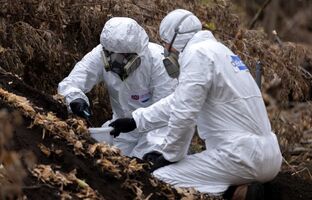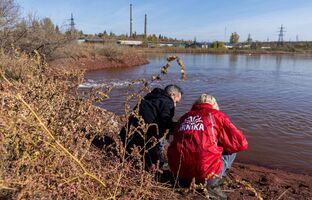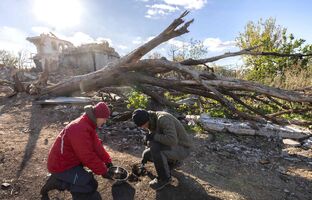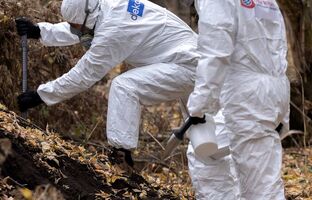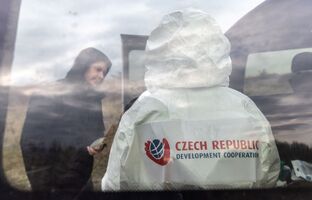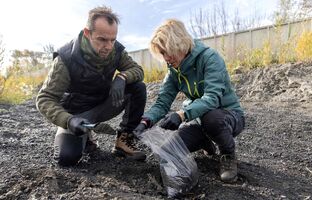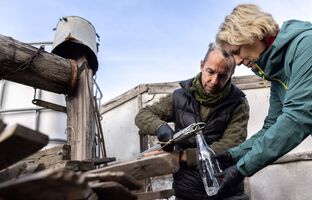The non-governmental organization Arnika, with financial support from the Czech Development Agency (CzDA), is launching another phase of mapping and remediation of environmental burdens in Ukraine’s Dnipropetrovsk region, together with Ukrainian partners. The region has long suffered from heavy industrial pollution and, since the start of Russian aggression, also from the war itself. The international survey will focus on forty additional high-risk sites, helping both local residents to avoid danger and authorities to plan for post-war recovery.
The Dnipropetrovsk region is among the areas most severely affected by the war and also one of Ukraine’s centers of heavy industry and mining. The conflict has deepened already existing environmental problems — new contamination caused by the bombing of industrial facilities and infrastructure accidents adds to the historical environmental burdens. Arnika, together with DEKONTA, a.s. and local partners, is now focusing on addressing these issues.
“I am pleased that we have been able to build on the short but successful intervention of 2024. That phase produced the first version of the database of environmental burdens in the Dnipropetrovsk region, established a prioritization of sites, carried out initial fieldwork, and prepared a foundation for further steps. In this follow-up phase, we want to go even further — our goal is to support local authorities, as well as the involved non-profit and academic sectors, in continuing systematic work with the identified environmental burdens. Therefore, we are preparing methodologies for database management, risk assessment, sampling and analysis, and for integrating environmental burden issues into regional strategies. The project also includes the preparation of at least two technical designs for subsequent remediation works,” says Jan Pejřil, CzDA’s coordinator for Ukraine.
“Our primary goal is to protect the health of residents exposed to toxic pollution. At the same time, when preparing for Ukraine’s post-war reconstruction, it will be essential not to forget the environment and the principles of sustainability. Our work will help ensure these principles are respected in the remediation of contaminated sites,” says Marcela Černochová, Arnika’s coordinator in Ukraine.
In addition to expanding the database of contaminated sites, Arnika and its partners will collect samples from selected locations and prepare technical documentation for the remediation of the two most affected ones. Czech and Ukrainian experts will also draft proposals to update the regional environmental strategy. The aim is to provide Ukrainian authorities and civil society organizations with tools enabling them to effectively address environmental burdens. The Czech Republic has extensive experience in tackling similar problems, including those caused by the former presence of Soviet troops.
“In 2024, together with Arnika, we created the initial database of polluted sites, which included forty locations, among them an illegal pesticide dump. In 2025 and 2026, we will expand and update this database. This will help us identify the risks faced by people living near these sites and plan their subsequent remediation,” says Olexij Angurets, director of the Ukrainian organization Security and Recovery Centre.
The Dnipropetrovsk region is a priority area of Czech development cooperation, and the Czech Republic has long supported projects focused on environmental restoration there. Czech companies and expertise in the field of environmental remediation may therefore play a significant role in the region’s post-war reconstruction.
“If the security situation allows, we would like to contribute directly to the removal of these environmental burdens. However, this will require the involvement of additional donors with adequate financial capacity. We will therefore actively seek partners willing to support the implementation of remediation projects. The purpose of this entire initiative is to complete the full cycle — from identifying environmental burdens and analyzing risks to their actual removal and safe reuse of the affected sites. Minimizing environmental risks and restoring these areas should be the guiding principle for such interventions,” adds Jan Pejřil.
“We are convinced that, at least in the Dnipropetrovsk region — and very likely on a national scale — we are the first to embark on such a comprehensive approach to environmental burdens during the ongoing full-scale invasion by the Russian Federation.”
The Czech Republic possesses substantial know-how in this field and can offer both the transfer of experience and concrete technical solutions — precisely the kind of expertise Ukraine will need to develop in connection with its future accession to the European Union. Establishing solid references and trustworthy partnerships now will open important opportunities for Czech companies and for further development and expert cooperation once the active phase of the war ends.
The project is funded by the Czech Development Agency under the Czech Republic’s Foreign Development Cooperation program and is being implemented in 2025–2026.



